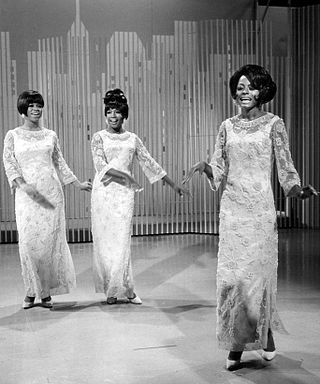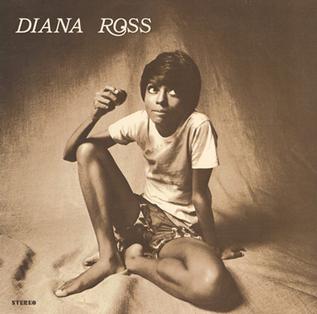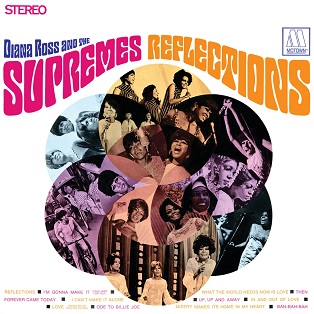Related Research Articles

The Supremes were an American girl group and a premier act of Motown Records during the 1960s. Founded as the Primettes in Detroit, Michigan, in 1959, the Supremes were the most commercially successful of Motown's acts and the most successful American vocal band, with 12 number-one singles on the Billboard Hot 100. Most of these hits were written and produced by Motown's main songwriting and production team, Holland–Dozier–Holland. It is said that their breakthrough made it possible for future African-American R&B and soul musicians to find mainstream success. Billboard ranked the Supremes as the 16th greatest Hot 100 artist of all time.

Florence Glenda Chapman was an American singer and a founding member of the Motown vocal female group the Supremes. She sang on 16 top 40 singles with the group, including ten number-one hits. After being removed from the Supremes in 1967, Ballard tried an unsuccessful solo career with ABC Records before she was dropped from the label at the end of the decade.

Mary Wilson was an American singer. She gained worldwide recognition as a founding member of the Supremes, the most successful Motown act of the 1960s and the best-charting female group in U.S. chart history, as well as one of the best-selling girl groups of all-time. The trio reached number one on Billboard's Hot 100 with 12 of their singles, ten of which feature Wilson on backing vocals.

Cynthia Ann Birdsong is an American singer who became famous as a member of The Supremes in 1967, when she replaced co-founding member Florence Ballard. Birdsong had previously been a member of Patti LaBelle & The Bluebelles.
"Someday We'll Be Together" is a song written by Johnny Bristol, Jackey Beavers, and Harvey Fuqua. It was the last of twelve American number-one pop singles for Diana Ross & the Supremes on the Motown label. Although it was released as the final Supremes song featuring Diana Ross, who left the group for a solo career in January 1970, it was recorded as Ross' first solo single and Supremes members Mary Wilson and Cindy Birdsong do not sing on the recording. Both appear on the B-side, "He's My Sunny Boy".

"Love Child" is a 1968 song released by the Motown label for Diana Ross & the Supremes. The second single and title track from their album Love Child, it became the Supremes' 11th number-one single in the United States, where it sold 500,000 copies in its first week and 2 million copies by year's end.

Lynda Laurence is an American singer. The youngest daughter of Louise and Ira Tucker, a gospel songwriter, producer, and singer, Laurence's siblings are Sundray Tucker and Ira Tucker Jr.

Farewell is a 1970 live album by Diana Ross & the Supremes. The album was recorded over the course of the group's final engagement together at the New Frontier Hotel and Casino in Las Vegas, Nevada, including the final night on January 14, 1970. The show marked Diana Ross' penultimate performance with fellow Supremes members Mary Wilson and Cindy Birdsong. At the conclusion of the show, new Supremes lead singer Jean Terrell was brought onstage and introduced to the audience.

Diana Ross is the debut solo studio album by American singer Diana Ross, released on June 19, 1970 by Motown Records. The ultimate test to see if the former Supremes frontwoman could make it as a solo act, the album was overseen by the songwriting-producing team of Nickolas Ashford & Valerie Simpson, who had Ross re-record several of the songs the duo had recorded on other Motown acts. Johnny Bristol, producer of her final single with The Supremes, contributed on The Velvelettes cover "These Things Will Keep Me Loving You."

Together, released by Motown in 1969, was the second and final duets studio album combining Diana Ross & the Supremes and The Temptations into an eight-person Motown act. Like the first duets LP, Diana Ross & the Supremes Join The Temptations, it is composed almost entirely of covers, including versions of The Band's "The Weight", Sly & the Family Stone's "Sing a Simple Song", Frankie Valli's "Can't Take My Eyes Off You" and Motown songs like "Ain't Nothing Like the Real Thing" and "Uptight ". "The Weight" was the only single in the US, and failed to make it into the American Top 40. "Why ", a UK exclusive single, was a Top 40 hit on the UK singles charts.

Let The Sunshine In is the sixteenth studio album by Diana Ross & the Supremes recorded and released by Motown in 1969. It contains the hit single "I'm Livin' in Shame", "The Composer," a Smokey Robinson composition that peaked at number 27, and "No Matter What Sign You Are," - a single produced by Motown chief Berry Gordy that failed to crack to Top 30. Motown had titled the album “No Matter What Sign You Are” originally; going as far as creating the front cover art with the title in it, but when the single didn’t chart as expected the album was retitled “Let The Sunshine In.” Though the album was released when the group consisted of Diana Ross, Mary Wilson and Cindy Birdsong, original founding member Florence Ballard appears on two songs.

Reflections is the twelfth studio album recorded for Motown by Diana Ross & the Supremes. Released in 1968, it was the first regular studio LP to display the new billing of the group formerly known as "The Supremes." It contains the singles "Reflections", "In and Out of Love" and "Forever Came Today". Also included are covers of songs made famous by Martha and the Vandellas and The 5th Dimension. Also present are songs written by other famous names, including "Bah-Bah-Bah" co-written by Motown singer Brenda Holloway with her younger sister, Patrice, an original Smokey Robinson composition titled "Then", and "What the World Needs Now Is Love" by Burt Bacharach and Hal David, which Motown planned to release as a single in the spring of 1968, but cancelled. It also contains a cover of Bobbie Gentry's "Ode to Billie Joe," whose original recording kept the single #2 "Reflections" from peaking at the top spot on the Billboard Hot 100 in September 1967, and it hit #2 on Cashbox.

Cream of the Crop is the eighteenth studio album released by Diana Ross & the Supremes for the Motown label. It was the final regular Supremes studio album to feature lead singer Diana Ross. The album was released in November 1969, after the release and rising success of the hit single "Someday We'll Be Together."

Greatest Hits: Live in Amsterdam is a DVD by The Supremes released in 2006.

Diana Ross & the Supremes Sing and Perform "Funny Girl" is the thirteenth studio album released by Diana Ross & the Supremes on the Motown label, released in 1968. Berry Gordy had Diana Ross & the Supremes cover the songs from Barbra Streisand's Broadway musical Funny Girl original cast LP to tie-in with the September release of the feature-film version of the musical, also starring Streisand. The LP was not a success, and, with a Billboard 200 peak of 150, ranks as the lowest-charting of the Diana Ross-led Supremes albums.
"Going Down For the Third Time" is a song written and composed by Holland–Dozier–Holland, and recorded by Motown singing group The Supremes in 1967. The song was issued as the b-side to the popular "Reflections".

"Everybody's Got the Right to Love" is a socially conscious–inspired pop song written by Lou Stallman, produced by Frank Wilson and released as a single in 1970 by Motown group The Supremes, who took the song into the top forty in mid-1970 following the release of "Up the Ladder to the Roof".

"Touch" is a soft ballad written by Pamela Sawyer and Frank Wilson, who also produced it as a single for Motown recording group The Supremes, who issued it as a single in 1971.

The Never-Before-Released Masters is 1987 compilation album containing unreleased recordings recorded by Motown girl-group The Supremes from 1961 to 1969. It was the second CD release of unreleased recordings by The Supremes, the first being disc two of the 2 disc "25th Anniversary" compilation. Several other unreleased tracks appeared on earlier various artists compilations.
The Return to Love Tour was a 2000 concert tour by American singing group Diana Ross and the Supremes.
References
- ↑ Strong, Martin Charles; John Peel (2004). The Great Rock Discography. Edinburgh: Canongate Books. p. 1495. ISBN 1-84195-615-5.